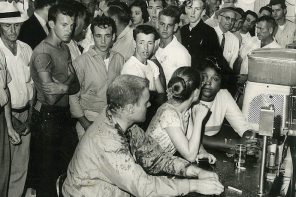Thanks to watching last night’s presidential debate, I now know that Mitt Romney either wants four trillion dollars in new taxes or he doesn’t, that Barack Obama either cut 700 million dollars from Medicare or he didn’t, and that Jim Lehrer either knows how long two minutes is or he doesn’t. (Seems like he doesn’t.)
But I don’t know anything about any social or religious issue—i.e., the kind of stuff we here at RD speak about all the time. Which brings up the question: are these issues irrelevant?
It’s obvious who would benefit from their invisibility: Romney. Poll after poll has shown that Americans are far to the left of this year’s Republican party platform, with its total ban on abortion (and by constitutional amendment at that) and opposition to same-sex marriage—to take but two bellwether issues. If the swing voters in the swing states knew about these stances, they’d be less likely to vote for Romney, even though he won the first debate in convincing, alpha-dog style. So it’s obviously in Romney’s interest to leave that stuff for the base and hush it up when it comes to winning over the middle.
But that partisan preference doesn’t explain why the president never mentioned social or religious issues, and why Lehrer never asked about them.
On the policy level, all we got, in almost two hours of tedium, was one tiny mention of Don’t Ask/Don’t Tell from Obama, and one veiled reference to “religious freedom” from Romney. Insiders know that the latter is code for exempting individuals and institutions from following government mandates on health care and provisions on anti-discrimination. But to the middle, Romney’s comment surely passed under the radar. And as for Don’t Ask/Don’t Tell, even Paul Ryan is for that now. All this in the shadow of an unprecedented legal war against women’s reproductive choices, and an ever-morphing campaign to turn the clock back on civil rights, now, as Romney’s insider-aside referenced, in the guise of ‘religious freedom.’
Ironically, the only meaningful reference to ‘our’ issues came from Romney, who characterized deficit reduction as a moral issue. This should’ve been an opening for Obama, had he chosen to veer off-script for even one minute of his tedious and labored performance—surely one of the worst in modern presidential debate history. Romney was right: economic issues are moral issues. His sense of economic morality, though, forged somewhere between focus groups and Ayn Rand, is very different from the one most Americans share. Obama could have taken up this claim, and articulated a different economic-moral vision, one in which the top wage-earners pay their share, and in which health care is not predicated on the right insurance bet. This could have been a worthwhile ethical exchange, undermining the too-neat claim that “it’s the economy, stupid,” and instead showing how economic and social issues are intertwined. Romney opened the door; Obama could’ve walked through it.
But no, like Romney’s 47% comment, like his flop-flopping, like reproductive choice, Obama left this opportunity on the table, preferring instead to wallow in Dukakis-esque statistics and details.
If Romney made the only reference to ‘values’ in the debate, he also showed why this whole process is shot through with “social” issues. How did Romney win? Certainly not by the numbers, or by consistency with his past positions. He won by being “presidential,” a highly debatable quality, shot through with assumptions about gender, race, and class, but nonetheless the most important factor for those muddle-headed moderates we refer to as undecided. Romney was The Man out there tonight, in all those gendered, racial, and class-bound ways. Inchoate as it was, he did in fact articulate a clear, moral vision: where men like him are in charge, free enterprise reigns, and those who are weak deserve the suffering they get. While preaching compassion, Romney exuded the cool confidence and blithe disinterest that served him well as a venture capitalist and endears him to libertarians. Unfortunately, an alternative model of human greatness was not provided on the other side—at least not on this night.
Social issues may be non-issues—but if you pay enough attention, the values underlying them remain front and center. The consequences, especially as Romney enjoys his post-victory bounce, are terrible to contemplate.



